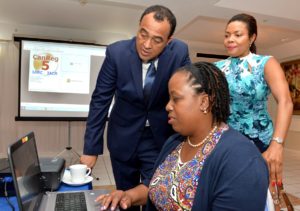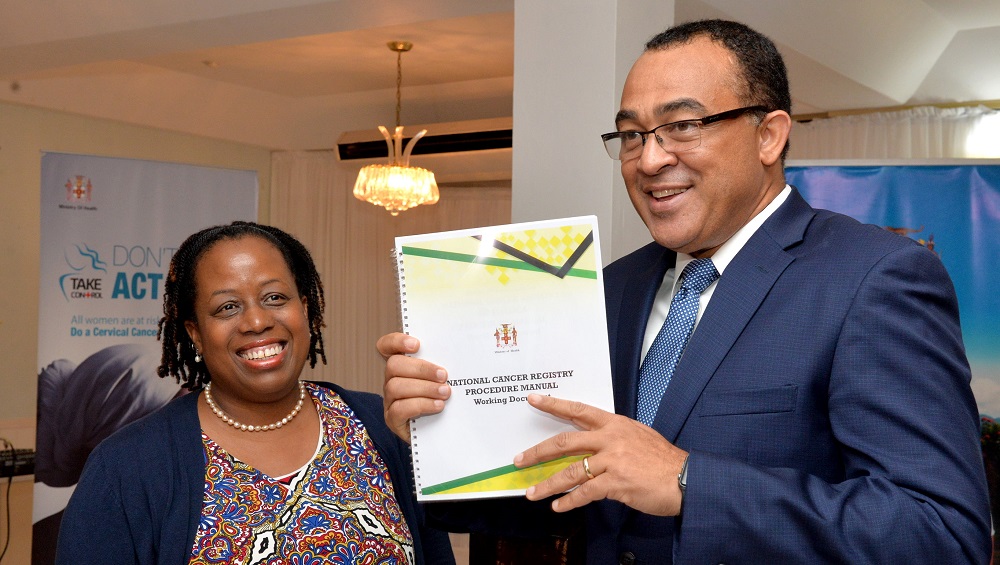#Kingston, December 12, 2018 – Jamaica – Health Minister, Dr. the Hon. Christopher Tufton, says the National Cancer Registry (NCR) provides a critical tool in guiding the planning and implementation of cancer prevention and control programmes. He noted that the population-based cancer registry, which covers the entire island, will actively collect information on all new cancer cases, including data on patient demographics and cancer type.
 It will help to identify areas for research and to better understand risk factors and causes of cancer in Jamaica.
It will help to identify areas for research and to better understand risk factors and causes of cancer in Jamaica.
“(This will help) to describe the burden and distribution of cancer as well as to monitor the impact of cancer prevention and control activities, including screening and early detection,” Dr. Tufton said.
He was speaking at the launch of the registry at the Eden Gardens Wellness Resort and Spa in St. Andrew on December 11.
The NCR, which is to be available to the country’s four health regions, will store information such as the type of tumour, its location, the stage of the cancer and treatment as well as other essentials.
It forms part of a Caribbean and global initiative by the World Health Organization (WHO), the International Agency for Research on Cancer and the Caribbean Public Health Agency to improve the availability of high-quality cancer data to guide decision-making to improve prevention, control and treatment of cancer.
Dr. Tufton said that the registry is in sync with the Ministry’s strategic priority, aimed at improving the quality of health information systems for the planning and management of health services. He advised of plans in the upcoming year for an information system “which we have made significant advances on over the past year and a half”.
“We have a plan, we now have the resources and we will be rolling out an appropriate pilot, which we believe will aid, support and complement an initiative such as this one (the registry). For us, quality and accurate information is critical for effective decision-making, and when it comes to non-communicable diseases such as cancers, it is absolutely vital,” he said.
The Minister expressed gratitude to several entities, such as the Pan-American Health Organization (PAHO), the Barbados Cancer Registry and the Caribbean Cancer Registry Hub for their partnership in providing technical support, equipment and capacity building.
Meanwhile, Advisor on Non-Communicable Diseases and Mental Health at the PAHO/WHO, Dr. Michelle Harris, emphasised the importance of the registry, arguing that it is essential to the monitoring and evaluation of specific cancer control measures aimed at reducing the burden and suffering from the disease.
“Cancer registries provide a unique source of such information on the scale, profile and evolution of the local  cancer burden. Jamaica has had a subnational cancer registry based at the University of the West Indies since 1958. PAHO is pleased to have supported the Ministry of Health in its effort to establish this national population-based cancer registry,” she said.
cancer burden. Jamaica has had a subnational cancer registry based at the University of the West Indies since 1958. PAHO is pleased to have supported the Ministry of Health in its effort to establish this national population-based cancer registry,” she said.
PAHO’s support, she added, included a cancer registry consultant, who travelled to the island last December to train and work with regional cancer registry teams to help to operationalise the NCR’s software.
For her part, Executive Director of the Jamaica Cancer Society, Yulit Gordon, described the registry as a “significant milestone” in Jamaica’s cancer prevention and control efforts and will equip the country with evidence-based information on all Jamaicans diagnosed with cancer.
“This data will enable us to develop key strategies to improve quality of care, reduce the number of premature deaths to the disease and the overall impact and burden that a cancer diagnosis places on our Jamaican families,” she said.
Release: JIS
Contact: Chad Bryan
Photo Captions:
Header: Health Minister, Dr. the Hon. Christopher Tufton, displays the procedural manual of the National Cancer Registry (NCR) at the launch held at the Eden Gardens Wellness and Spa Resort in St. Andrew on December 11. Sharing the moment is Director of Non-Communicable Diseases (NCDs) and Injuries Prevention in the Health Ministry, Dr. Tamu Davidson.
Insert: Health Minister, Dr. the Hon. Christopher Tufton (left), observes a demonstration of the National Cancer Registry (NCR) by Director of Non-Communicable Diseases (NCDs) and Injuries Prevention in the Health Ministry, Dr. Tamu Davidson. Occasion was the launch of the NCR at Eden Gardens Wellness and Spa Resort in St. Andrew on December 11. Also looking on is Executive Director of the Jamaica Cancer Society, Yulit Gordon.
Dave Reid photos


 TCI News1 week ago
TCI News1 week ago
 News7 days ago
News7 days ago
 Bahamas News4 days ago
Bahamas News4 days ago
 News6 days ago
News6 days ago
 Bahamas News3 days ago
Bahamas News3 days ago
 Caribbean News7 days ago
Caribbean News7 days ago
 Health3 days ago
Health3 days ago
 News1 week ago
News1 week ago












